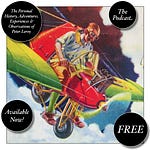JUST BEFORE I began reading “The Art of Obvious Subtlety,” episode forty-one of Dead Air, a guest arrived from out of the past. He slipped into the back of the room — as well as a big man with a face familiar to millions can slip into a room — and settled himself into a wing chair. He gave me a wave, and I returned it, and then I read.
WHEN I WAS A BOY, about thirty-seven years ago, I dug a cave in my parents’ back yard with my friends Raskol, Marvin, Spike, and Matthew. This cave was our hideout, a place to be safe from anyone who might be out to get us. We divided the labor in a way that seemed fair to me. While they worked underground, enlarging the lair, I worked above ground, concealing it, and concealing their work, and even concealing my own.
On the roof of the underground structure that was growing beneath me, I began to remake the landscape of the back yard into what it ought to have been. I didn’t realize how dissatisfied I had been with the yard until I stepped back from my work after a day or two and saw how much I had deviated from, and improved upon, the original. What had been a flat and uninteresting bit of Long Island had taken the form, in miniature, of an imaginary bit of the Adirondacks. The contours I had made gave the landscape the gift of vistas, and the scrubby trees I had transplanted assumed by association with hills and vistas a grander stature than they had ever had on their own. Sometimes, after an afternoon’s efforts, I would stretch out on the ground, bringing my eye down to a mole’s level, so that the effect would be exaggerated, and in that position I could imagine my molehills as mountains. Unfortunately, I was often discovered in this position by my comrades, with the result that they began to think of me, unfairly and inaccurately, as a layabout, a shirker.
I complained about this sad circumstance to my friend, confidant, and business partner Porky White, proprietor of the Kap’n Klam clam bar. “I don’t get it, Porky,” I said. “I work as hard as they do. I work harder than they do. I mean, I have to hide all the dirt they bring out of the hole, and I do it. By the time they climb out of that hole, tired, dirty, and pleased with themselves, they can’t even tell where the dirt went. What do they think I’m doing with it, eating it?”
Porky chuckled and shook his head with that look he wore whenever he was about to ask me when I would ever learn and said, “They don’t even seem to notice how much work you’ve done, right?”
“Yes! Yes! That’s exactly right. At first, I thought they were just pretending not to notice. Then I began to think that they were flattering me, that they were exaggerating my success by pretending they didn’t notice. Then I saw the truth: they really don’t see what I’ve done, they don’t appreciate it, and they don’t think I’ve been working very hard. Why? Why is that?”
“Because you’ve done the work too well,” he said at once. “I think you’ve done an extraordinary thing, done your job so well, performed your magic so smoothly that the sleight of hand is entirely imperceptible. When will you ever learn?”
“I knew you were going to say that,” I said.
“You’ve been too sly, Peter. Or maybe I should say that you’ve been applying your skills to the deception of the wrong audience.”
“I don’t follow you.”
“You’re doing all this work of hiding the hole and the sand from the hole, right?”
“Right.”
“And you are trying to hide it from some potential interloper, an unknown someone who might come along and discover the fort.”
“The cave.”
“The cave. Sorry. You’ve done a great job — I’m sure you have — but you have no audience for your work. There is no one who can appreciate it. The interloper certainly can’t, because if you’ve done the job as well as it ought to be done, as well as you hope you’ve done it, the interloper will never see it!”
“Of course.” I said. “That’s the whole point. I don’t see what you’re getting at.”
“All along,” he said, “you’ve had another audience — Raskol, Marvin, Spike, and Matthew — and you want them to appreciate your work.”
“Sure. That’s — ”
“If you want them to appreciate it, you’ve got to make them see it, and sometimes people just can’t see what’s right in front of them.” He pointed to the flying-saucer detector on the counter. “Look,” he said. “Look at this. Most people can’t tell that this is a flying-saucer detector. Basically, it looks like those transmitters you build — or like a regular radio without its cabinet. It’s got the bell and the compass thing, but otherwise it could be a radio. If we didn’t have the sign on it, ‘Magnetomic Electronic Five-Stage Distant Early Warning Saucer-and-Warhead Detector,’ nobody would know what it was.”
“So I put all that effort into work that they couldn’t even see,” I said, since I saw at last.
“Right. If you want them to see it, hang a sign on it.”
“When will I ever learn?” I asked.
“Quite possibly never,” said Porky.
AFTER THE APPLAUSE had died down, I extended my hand toward the big old man at the back of the room and said, “Ladies and gentlemen, it gives me great pleasure to introduce to you the reclusive genius behind the worldwide Kap’n Klam chain of bivalve-based family restaurants: Kap’n Klam himself, Porky White!”
Porky got to his feet, with some difficulty, it seemed to me, and he waved a sheet of paper that he was clutching. “I meant to be here much earlier in the series,” he said to me, “but I just got caught up in this whole fiasco of the vegetarian clam we’re introducing, and it just — well, you probably haven’t given much thought to how hard it is to make a vegetarian clam. It’s the kind of thing you start working on full of optimism and then before you know it six months of your life have gone by like a billboard on a highway, and you say to yourself, ‘How did I ever get into this?’ But I think we’ve got it licked now.” He dropped his voice and looked over his shoulder, as if he were checking for industrial spies, then turned back toward the room and said, in a confidential tone, “Basically, for the bodies we’re using a rubbery, chewy, slippery kind of Chinese mushroom — elephant ear — and for the bellies, the guts, a little ball of mashed eggplant — but there’s a lot more to it than that, as I’m sure you can imagine. Anyway, Peter, I did intend to get here earlier, but I’m glad you faxed me this memoir flyer to remind me.” He waved the sheet at me. “Sign me up!”
“Really?”
“Sure. I’ve been thinking of writing my memoirs for a long time now, but it’s just one of those things that I never get around to. There’s always a vegetarian clam or something getting in the way.”
[to be continued]
Subscribe to The Personal History, Adventures, Experiences & Observations of Peter Leroy
Share The Personal History, Adventures, Experiences & Observations of Peter Leroy
Watch Well, What Now? This series of short videos continues The Personal History, Adventures, Experiences & Observations of Peter Leroy in the present.
Have you missed an episode or two or several?
You can begin reading at the beginning or you can catch up by visiting the archive or consulting the index to the Topical Guide. The Substack serialization of Little Follies begins here; Herb ’n’ Lorna begins here; Reservations Recommended begins here; Where Do You Stop? begins here; What a Piece of Work I Am begins here; At Home with the Glynns begins here; Leaving Small’s Hotel begins here.
You can listen to the episodes on the Personal History podcast. Begin at the beginning or scroll through the episodes to find what you’ve missed. The Substack podcast reading of Little Follies begins here; Herb ’n’ Lorna begins here; Reservations Recommended begins here; Where Do You Stop? begins here; What a Piece of Work I Am begins here; At Home with the Glynns begins here; Leaving Small’s Hotel begins here.
You can listen to “My Mother Takes a Tumble” and “Do Clams Bite?” complete and uninterrupted as audiobooks through YouTube.
You can ensure that you never miss a future issue by getting a free subscription. (You can help support the work by choosing a paid subscription instead.)
At Apple Books you can download free eBooks of Little Follies, Herb ’n’ Lorna, Reservations Recommended, Where Do You Stop?, What a Piece of Work I Am, and At Home with the Glynns.
You can buy hardcover and paperback editions of all the books at Lulu.
You’ll find overviews of the entire work in An Introduction to The Personal History, Adventures, Experiences & Observations of Peter Leroy (a pdf document), The Origin Story (here on substack), Between the Lines (a video, here on Substack), and at Encyclopedia.com.
















Share this post